I spent my childhood and teenage years in Pano Kivides, a small village in the mountains of Troodos in Cyprus; a rural community without computers, internet or even home addresses and landlines. The people around me lived isolated, traditional lives. Not surprisingly, there was not much space for differences, diversity or change. For the greatest part of my adult life, I considered this beginning as something that has limited my experience, a handicap I needed to make up for. However, I now see it as a blessing in disguise.
As a child who enjoyed reading, I broke the narrow boundaries of social and intellectual insularity by studying whatever I could get my hands on: first history, philosophy and literature and later on, physics, cosmology and astronomy. These provided me with all the heroes and heroines I needed to keep going. Early on, I realised that there is no problem which cannot be solved, only problematic situations that await to improve. Since then, I never stopped believing in personal agency, the ability to solve my problems and achieve my goals. This mindset of minimizing self-doubt, questioning fixed systems of thought and moving on while acquiring new knowledge and skills, took me higher and further in life than I ever had imagined as a young boy. In the two decades that followed after I finished secondary school, I realised that I had acquired diverse and extraordinary experiences and had become someone who could enable others find their own way to personal and professional fulfilment.
In 2000, I finished secondary school as valedictorian, achieved the highest score in the national University entry exams for Humanities and Social Sciences, and was awarded three scholarships for my undergraduate studies in History and Archaeology. Before going to University, I joined the army for two years where I was selected to be trained as a military officer. Soon after, I was promoted to a second lieutenant. During those years I learned how to adapt to very difficult situations, overcome physical and mental challenges, and inspire others to persevere, be resourceful and always stay together.
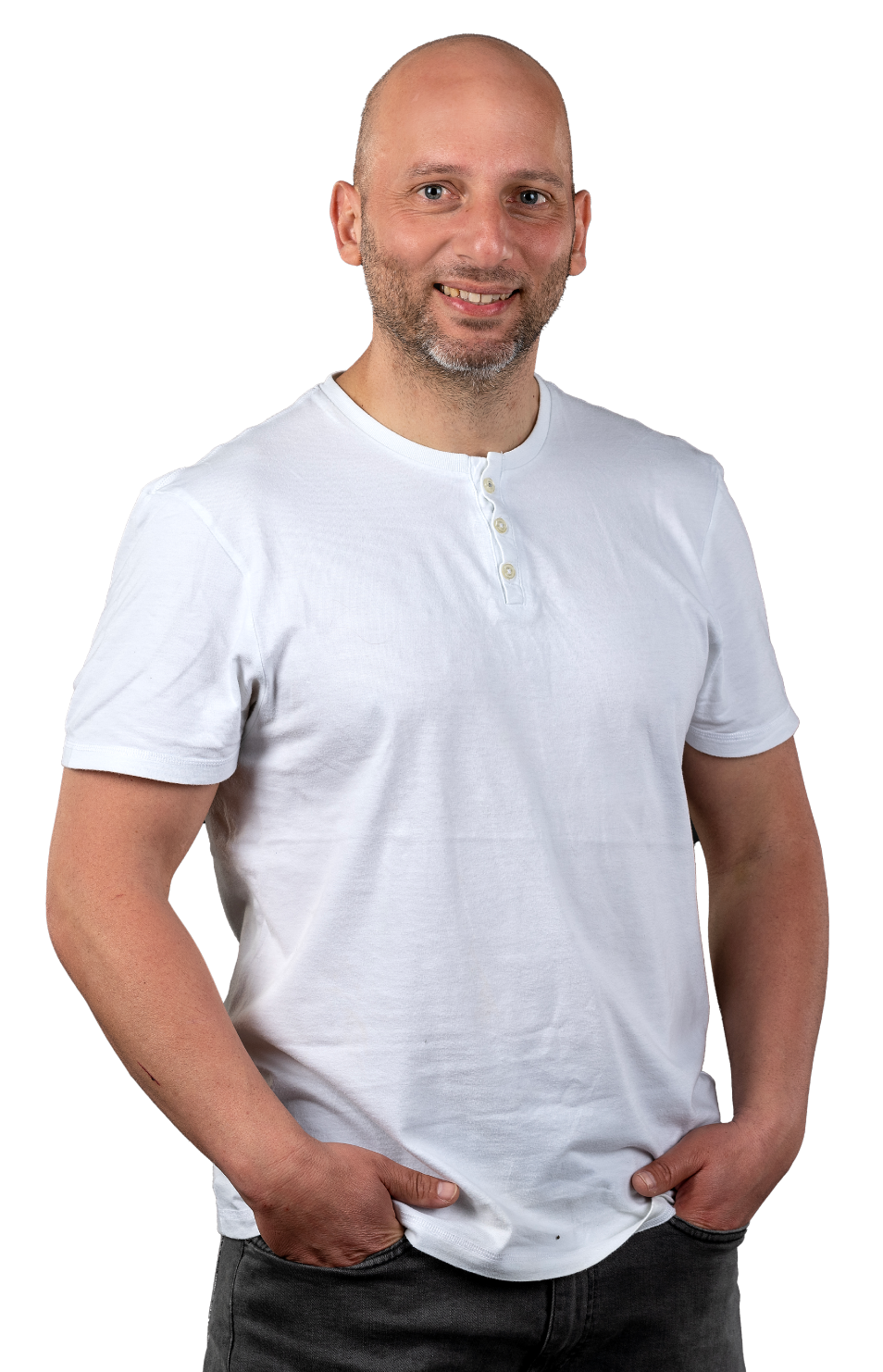
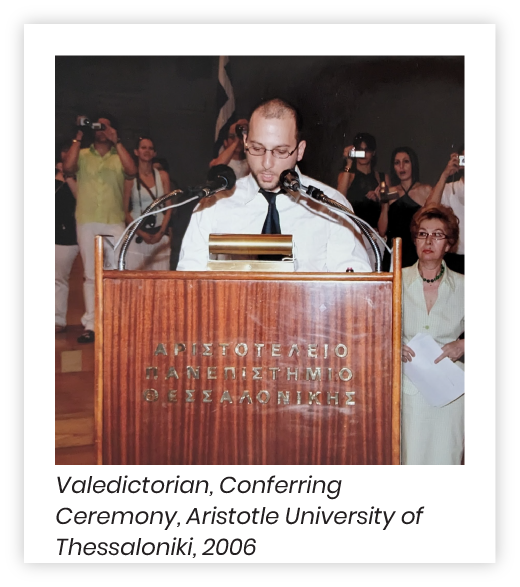
Having completed my army service at the age of 20, I moved to Greece to read History and Archaeology at the Aristotle University of Thessaloniki. I completed my degree with Distinction more than a year ahead of time and was honoured as valedictorian of the School of Philosophy in 2006. My time in Thessaloniki was one of the best in my life; I travelled around Greece, met very interesting people and made friendships I still cherish to this day.
Upon the early completion of my undergraduate studies, I chose to move first to the UK for an MA in Modern History at Royal Holloway, University of London, and then to Italy, becoming the first Cypriot to be admitted at the European University Institute in Florence, for a fully-funded MRes and PhD in History and Civilization. My postgraduate studies in London and Florence provided abundant opportunities to grow both as a person and a scholar. Following my passion for the study of people’s ideas, values, and beliefs and how these change across time and space, I wrote an award-winning doctoral thesis in gender history. However, my greatest achievement during those years was not an academic but a personal one. Towards the end of my MA, I met the person who was meant to be my future wife, best friend and mother of our two wonderful children.
When I received my doctorate, my wife and I decided to move back to Cyprus. However, not everything turned out as planned. When our first son was born in 2010, I found myself without a job, in a country suffering the worse financial crisis in its history, competing in a job market where knowing the right people seemed to be more important than having the right skills, abilities or credentials. Part-time, temporary and hourly paid, teaching jobs allowed me to enjoy fatherhood, publish my PhD thesis and follow my passion in photography, but could not provide me with financial security or career opportunities.
After a year of financial insecurity, I applied for a position of Project Manager in Research and Innovation at the Cyprus Research Promotion Foundation. I took the job after coming first in written exams among over 400 applicants who had a postgraduate degree as minimum qualification. As a Project Manager, I was responsible for the successful implementation of over 50 scientific projects with a combined budget of over 15 million euros. I was also appointed as the National Contact Person for the participation of Cyprus in CERN, Switzerland. That was the highlight of my job and one of the greatest experiences of my life: visiting the Large Hadron Collider, the place where the secrets of the Universe are revealed in humanity’s largest scientific experiment to date. However, not even that compared to the joy of welcoming to life my second son in 2012.
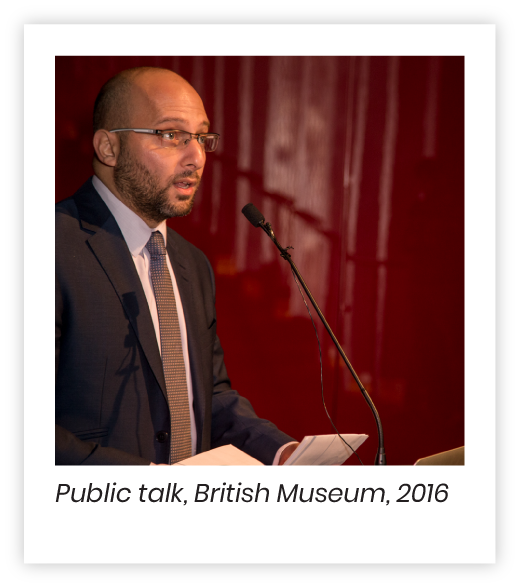

In the meantime, my wife and I were feeling unsatisfied by the limitations of our life and the opportunities afforded to us. We thought that returning to London could provide more life opportunities and experiences for the whole family. Breaking the boundaries of our comfort zone, leaving behind job security and support circles was not an easy decision. But we both knew very well that personal growth would never come easy, and so started planning our next move. In 2014 we moved with our boys to London where I took the job of Cultural Counsellor at the Cyprus High Commission.
Even though it took me a while to realise, the four years I served as a diplomat was a school like no other: it was an unimaginably hard journey of unimaginably large growth. The first and most important lesson this journey taught me was my limits. I discovered, in a very bad way, what is too much, too fast, and too difficult to absorb. Changing country, changing career, taking on a senior diplomatic role at a young age, adapting to a professional environment that needed drastic change while balancing long hours in office and frequent evening events with family time, was very challenging.
For the first time in my life, I doubted myself. I started questioning our decision to emigrate. I didn’t have the clarity to recognise which thoughts were truly mine and what was torturing, relentless noise from other people’s expectations about the kind of person I ‘should’ be. I fell in the trap of ignoring warning signs and soon never-ending thoughts let to sleepless nights, helplessness, exhaustion, isolation, anxiety and depression. I don’t know how many of you managed to hit rock bottom in your lives but when I did it was very clear. Under the suit, behind a large office and invitations to luxurious events with fake smiles and firm handshakes, I was hiding a mental and emotional wreck. I was sad, drained and broken; an invisible force had taken all the joy in my life.
With a lot of support, I made it to a moment when I realised that nothing external actually broke me; I broke myself. The real enemy was within, was not playing fair, knew me inside-out, managed to stay hidden and was always one move ahead. With nothing left in the tank of self-destruction, it became clear that I had to bounce back. I started running to work, eating better, taking breaks, sleeping, resting, breathing, rewarding myself and slowly mastered the subtle art of saying no to people when I had to. This big bounce of increasing self-awareness hasn’t stopped since.
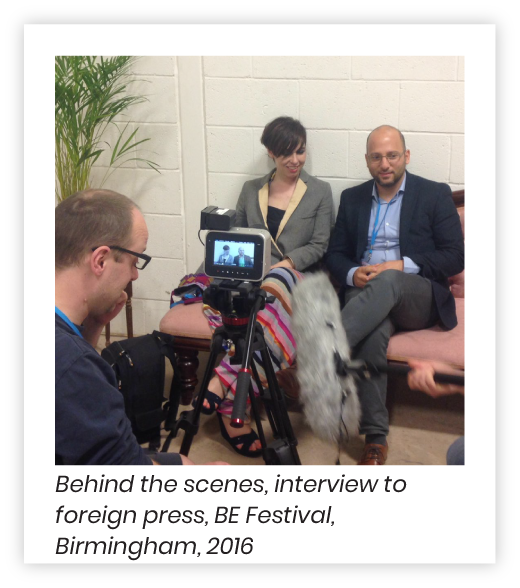
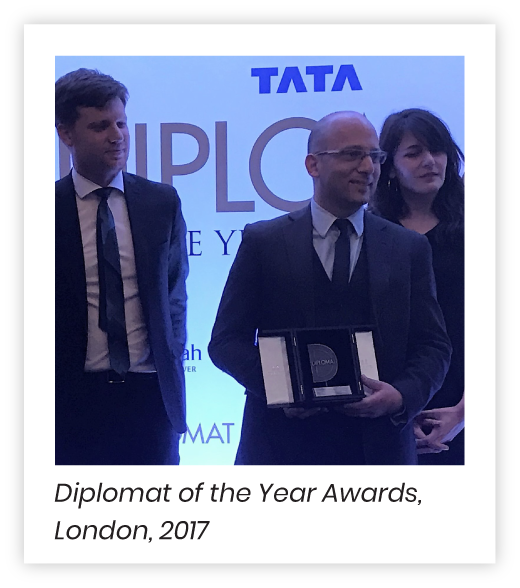
By the end of my diplomatic appointment in 2018, I was extremely proud of my achievements. I had multiplied our digital and physical audience, successfully organised more than 50 sold-out cultural events, had created long-term partnerships with world-leading institutions such as the British Library, the British Museum, King’s College London and the Universities of Oxford and Cambridge. I also took senior roles in cultural diplomacy on an international level and in 2016 I was elected President of EUNIC London, one of the largest clusters of national cultural institutions in the world. A year later EUNIC London received for the first time the prestigious “TATA Diplomat of the Year” award for its “Contribution to a Better Cultural Understanding among Nations Accredited to the Court of St James’s”. In my roles as Cultural Counsellor of the Cyprus High Commission and President of EUNIC London, I talked before live audiences, I made frequent appearances on radio and TV, collaborated with important entrepreneurs, philanthropists, artists, academics, athletes, researchers and curators. When my contract ended I was very sad to go but I was also very full, knowledgeable, and ready to take on a new challenge.
I knew I enjoyed working with people and helping them grow and I found that education could be a good option to apply and improve these skills. For the next two years, I worked in secondary schools and colleges teaching History and Sociology, mainly to GCSE and A-Level students. While being a diplomat and an academic helped me discover my limits and become self-aware, being a teacher helped me develop empathy and awareness about other people’s abilities, goals and limits. When I got my first teaching role in North London, my primary aim was to create a nurturing environment for my students that would encourage critical thinking, commitment to learning and building of self-confidence. Ten months on, over half of my students exceeded their target grades in their exams while the percentage of students not meeting their target grades dropped by 28% in comparison to previous years.
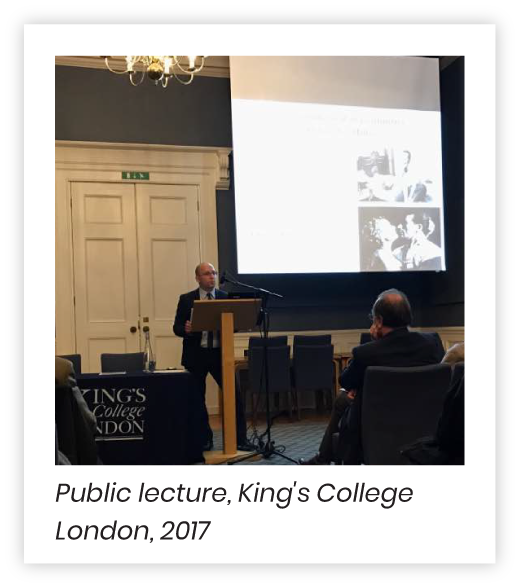
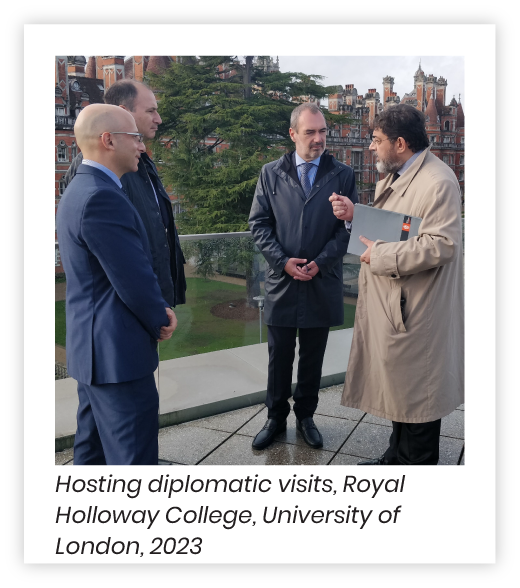
After 2 years helping students to grow and excel, I decided that I wanted to make myself useful in a similar way to adults. I also wanted my next professional step to be a role that would allow me to apply and further develop the competences I gathered as a project manager, academic, diplomat and teacher. For these reasons, in February 2021, I joined Royal Holloway, University of London as Deputy Director of the Hellenic Institute and Director of the Centre for Greek Diaspora Studies. At Royal Holloway, I was responsible for building and expanding international networks of people and organisations who promote the study of migrant communities from a social, historical, economic and cultural perspective. This role allowed me to better understand changes in people’s ideas, emotions, values and beliefs as these were key subjects in most of our interdisciplinary projects.
Adapting to change, embracing the fluidity of the future and staying committed to goals is something that helped me a lot in my life journey and having the chance to lead research on how communities do this on a collective level, how people grow support networks as they feel woven by the same thread, was very insightful, inspiring and rewarding. I shared these ideas with fellow academics, students and colleagues but also with funders, stakeholders, politicians and administrators. I also communicated the results of our research to the wider public. During my time at the Hellenic Institute and the Centre for Greek Diaspora Studies, our external funding quadrupled and the number of our activities, events, audiences, partners and projects had increased exponentially.
After gathering a mass of experience from different sectors, I have now returned to my true passion; teaching. I am currently working as Sociology Lead at one of the best schools in the country. This role combines my love for learning and my love for people both in the study of societies and in the everyday opportunities it affords to make positive contributions to young peoples’ lives.
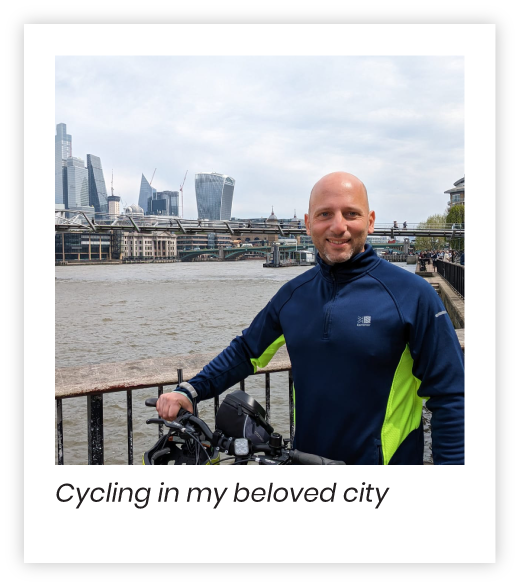
I live with my wife and our two sons in North London. Family means everything to me and being a husband and father is the most important, wonderful and fulfilling part of my life. I love cooking, playing with my kids, doing DIY projects, doing sports, going outdoors, cycling, visiting museums and art galleries and building with my wife what we think is a better future for our family. That last bit often involves a lot of – mostly enjoyable – talking! A typical good day for me starts when I know that everyone I love and care about are in good health, continues with a high-intensity workout and finishes when I manage to learn something new and share it with others. I have a big passion for science and especially theoretical physics, cosmology and the study of human consciousness. I am intrigued about how knowledge from these fields can be combined with practical philosophy to positively impact the way we see ourselves, experience our emotions and perceive reality. I am also in the process of writing a new book which attempts to offer a new scientific and philosophical perspective on life’s big questions.

Martin Luther King Jr, 1967
I now envisage to take the knowledge, experience and skills I gathered from my life journey to help others to find their own, unique path to self-development. I am extremely motivated in making myself useful by thinking outside the box to help individuals and companies commit themselves in a trajectory of growth. AchillesWay is a pathbreaking, innovative, challenge-led and results-oriented methodology which helps individuals and companies to gain perspective on their own vision of how things should be in the short-, mid- and long- term future. Then it lays a pragmatic and well-monitored plan on how to get there. One of the simplest things I realised in the past 20 years as a manager, researcher, academic, teacher, director and diplomat is that most people are able to create great plans. In other words, almost nobody starts heading to nowhere or without the intention to finish what they started. However, the reason why only a small fraction of people and organisations fulfill their vision almost always comes down to a gradual – and often unnoticed – loss of focus, clarity and balance. AchillesWay is the ultimate platform for individual and companies to regain, maintain, embrace and utilise those qualities so that success becomes not just a goal but an inevitable outcome.
